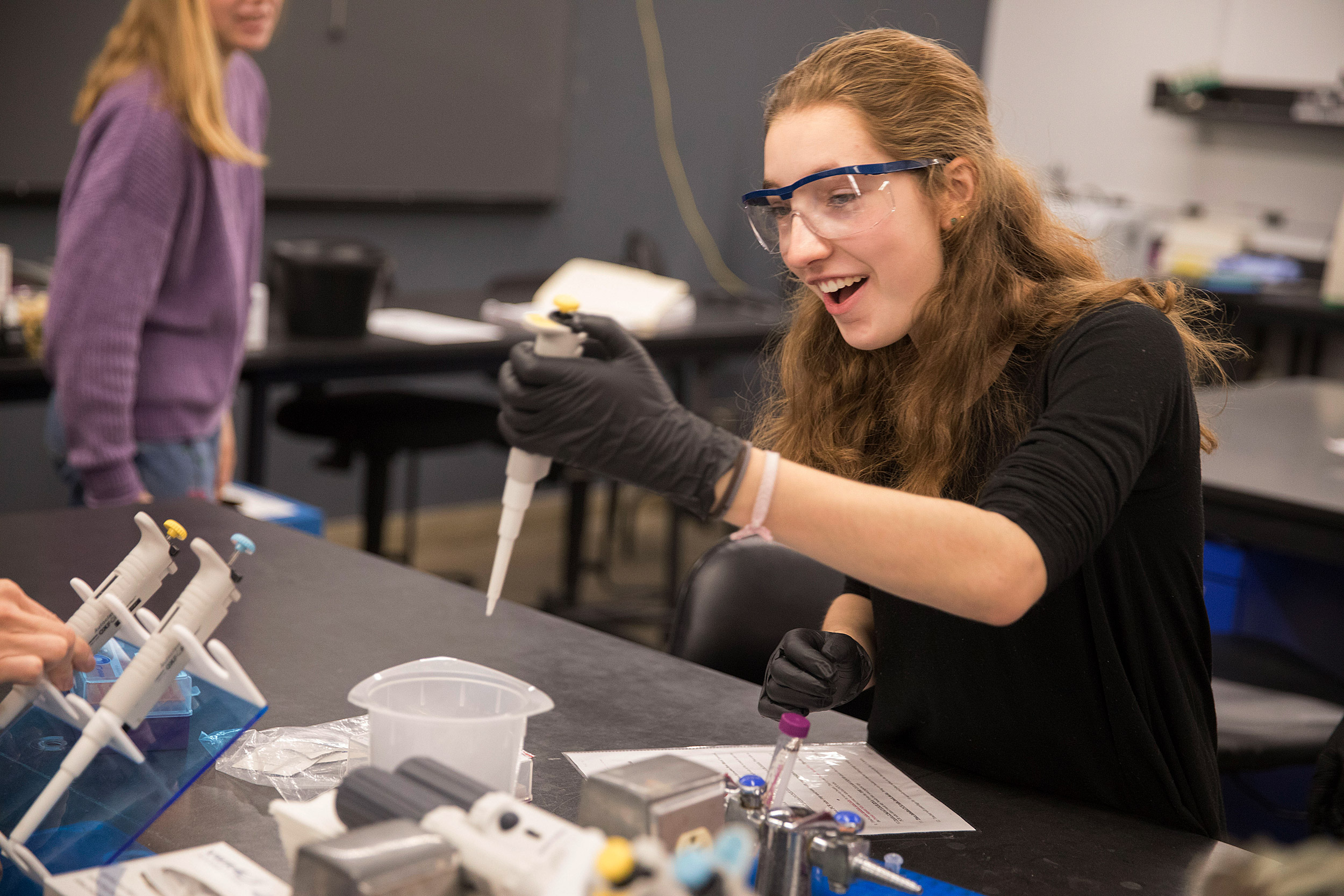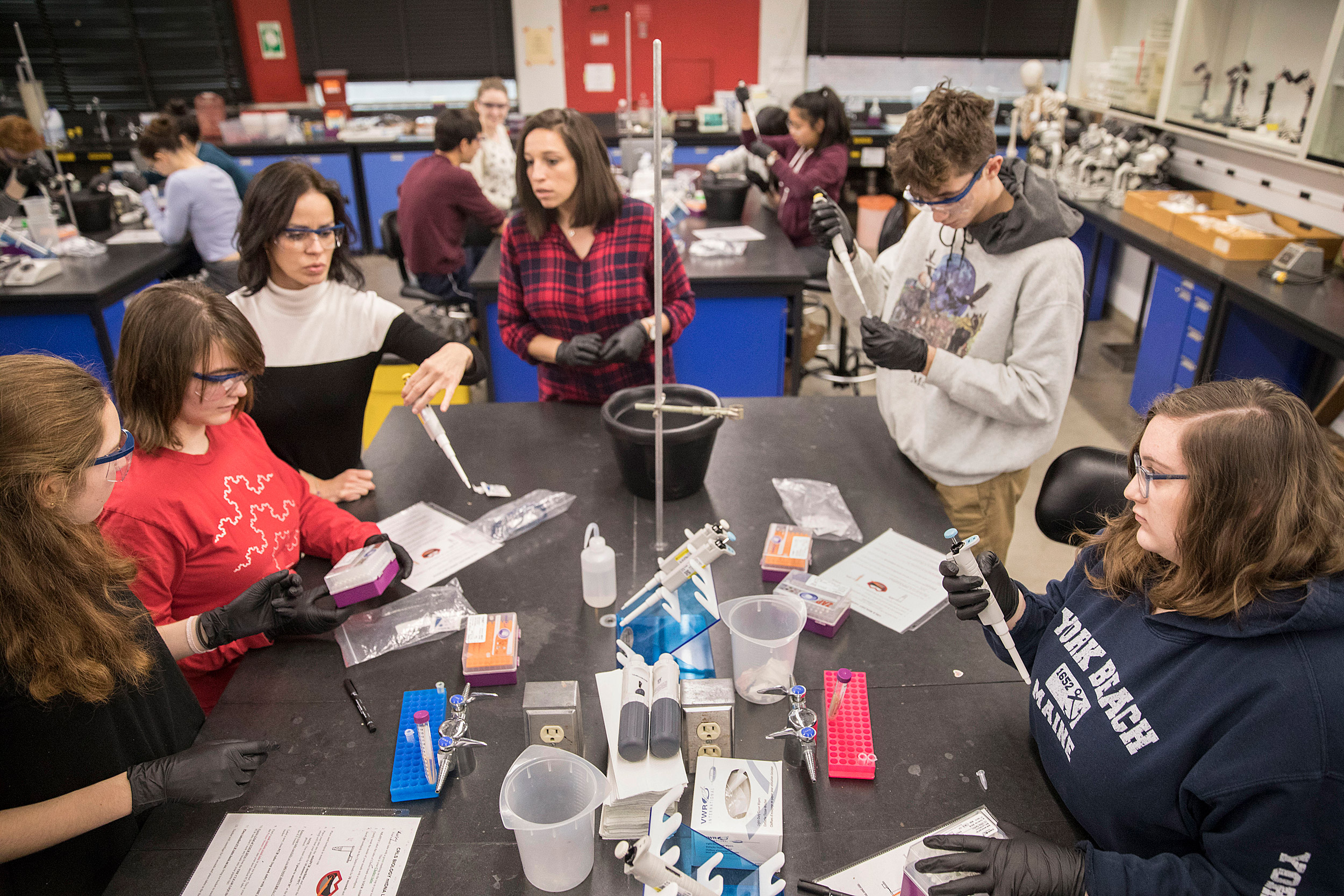
Cambridge Rindge and Latin student Hannah Thomsen isolates her DNA for sequencing during an Amgen biotech lab inside the Science Center.
Kris Snibbe/Harvard Staff Photographer
Learning to understand their own DNA
Harvard opens its labs to help local high school students decode biotech
On the fourth floor of Harvard’s Science Center, high school biology students from Cambridge Rindge and Latin School (CRLS) put on safety goggles and gloves, and step up to lab tables conveniently set up with pipettes, centrifuges, and other implements.
Then they get to work isolating their own DNA.
“This is real-life science, the stuff that people who work in biotech are actually doing in their labs, and the fact that kids get to do this at the high school level is amazing,” said Janira Arocho, a biology teacher at CRLS. “I didn’t get to do this type of stuff until I was in college.”
Teaching younger students the tools of modern science is the goal of the Amgen Biotech Experience (ABE,) a STEM (science, technology, engineering, and mathematics) program that opens the field of biotechnology to high schoolers and their teachers, while at the same time teaching them how to approach science as critical thinkers and innovators — and a lot about who they are.
“It’s normally really, really challenging to give them a good sense of what happens just by lecturing about it,” said Tara Bennett Bristow, site director of the Massachusetts ABE. “The ABE program is not only helping to increase their scientific literacy in biotechnology, it’s exposing them in a hands-on fashion, which generates enthusiasm.”
In its sixth year in Massachusetts, the local branch of the program is a partnership between the Harvard and the Amgen Foundation. A foundation grant through the University’s Life Sciences Outreach Program provides the kits of materials and equipment for students to do labs that mirror the process of therapeutic research and development, and Massachusetts teachers participating in the program complete summer training workshops at Harvard.
Arocho, who has participated in the program for several years, said with the training, “I was able to learn everything my students would be doing ahead of time, as opposed to learning along with them in my own classroom.”
More than 80,000 students around the world — 6,000 of them from Massachusetts high schools, along with 100 of their teachers — participated in ABE last year. At Harvard, which in July received another three-year grant to continue ABE programming, about 500 CRLS students are able to use the undergraduate biology teaching laboratories, where their own teacher leads the lab and graduate students and postdoctoral fellows are on site for assistance.

CRLS students Hannah Thomsen (from left) and Elizabeth Lucas-Foley work with their Biology teacher Janira Arocho, GSAS student Alyson Ramirez, and CRLS students Peter Fulweiler and Kerri Sands.
Kris Snibbe/Harvard Staff Photographer
In one lab in December, the CRLS students isolated their own DNA (their results were sent out for sequencing, and reports returned to them several days later for analysis). In another, the students produced a red fluorescent protein — used in the field for in vivo imaging — with common biotech tools.
Alia Qatarneh, the site coordinator of the ABE program at Harvard, leads teacher ABE workshops, training, and student labs. Qatarneh said she is particularly excited that the program was just implemented at her alma mater, Boston Latin School, where she was able to teach an ABE lab to four advanced placement biology classes last fall.
“It was amazing to go back to Boston Latin and think of my own experience as a high school student. I was so into science and loved hands-on things, but didn’t take AP biology because I was scared,” she said. “If I were a high school student and I had a chance to hold pipettes, to change the genetic makeup of bacteria to make it glow in the dark, how cool would that be?”
An assessment by the nonprofit research firm WestEd found that the ABE program substantially adds to students’ knowledge of biotechnology, and increases their interest and confidence in their scientific abilities. The program is open and for free participating high school biology students, including those with learning disabilities, and even those without an interest in science.
“Students may say, ‘Wow biotech, I didn’t know that this field existed. I thought that if I liked science I had to be a doctor, and now I have this whole different path in front of me,’” Qatarneh said.
Arocho said her students love going to Harvard, seeing what the labs look like, and doing their work there. “Alia always starts by telling them that this is the exact same lab that the Harvard freshman are doing, and the exact same place, so they do get excited about that,” she said.
CRLS junior Peter Fulweiler, one of Arocho’s students, said the best part is taking what he learned in the classroom and putting it all together in the lab.
“I love the hands-on part of this. It’s really interesting, because it’s not like we are reading instructions; we are making an attempt to actually understand what we are learning by doing it,” he said. “The bonus is that we get to find out where we are from on our mothers’ side.”
Science teacher Lawrence Spezzano is one of 10 instructors at Boston Latin now implementing the ABE program. He said it allows for flexibility and differentiation, and enhances learning opportunities as well as classroom logistics.
“The program was perfect. As an AP biology teacher struggling to fit more labs and biotechnology into a time-constrained curriculum, the mapped-out process is creative and engaging to both me and my students,” Spezzano said.
Kerri Sands, a junior at CRLS, said she has always dreamed of being a geneticist. She wants to eventually change the future of medicine, and now feels like she can.
“I just love the science of this, the lab is like my home. I love the whole experience of everything from the micro pipetting to the centrifuging. I love it all,” she said. “This has made my passion for science even stronger.”




